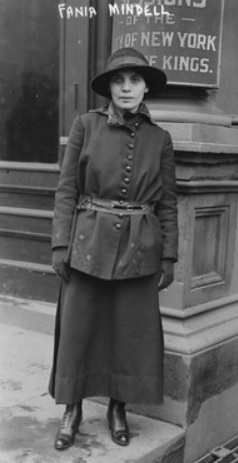Fania Mindell
| Fania Mindell | |
|---|---|

Mindell outside Manhattan courthouse in 1917
|
|
| Born | Fania Esiah Mindell December 15, 1894 Minsk, Belarus, Russia |
| Died | Script error: The function "death_date_and_age" does not exist. Mexico City, Mexico |
| Known for | Co-founding what later became Planned Parenthood |
| Spouse(s) | Ralph Edmund LeClercq Roeder |
Fania Esiah Mindell (December 15, 1894 – July 18, 1969) was an American feminist, activist, and theater artist.
Life and career
Mindell was born in Minsk, Russia on December 15, 1894. She emigrated to Brooklyn, New York in 1906 with her parents and family, and became a US citizen in 1919.[1] She was an accomplished artist, and became a set and costume designer for Broadway theaters in New York.[2] She translated dramatic materials from Russian to English including her version of Maxim Gorky's play, "Night Lodging", which was performed at the Plymouth Theater in 1920.[3][4] Edward G. Robinson was among the performers.[5] Fania was also the proprietor of Little Russia, a small boutique in Greenwich Village, just off Washington Square which featured curios from Russia, but her true passion was for feminist and progressive causes.[6][7]
As a young political activist in 1916 she met the now famous feminist Margaret Sanger and her sister Ethel Byrne. Together, the three women opened the first birth control clinic in the United States in Brooklyn known as the "Brownsville Clinic" (after the Brownsville section of Brooklyn in which it was located).[8] The clinic caused an immediate sensation in the press, getting national attention, and all three women were arrested and tried for "distributing obscene materials".
"The police monitored the Clinic from its opening and sent in a female undercover agent to purchase contraceptive supplies. On October 26 (1916) an undercover police woman and vice-squad officers raided the clinic, confiscated an assortment of contraceptives from pessaries to condoms, along with 20 'books on young women', and arrested Sanger, Byrne and Mindell. After being arraigned, Sanger and Mindell spent the night in the Raymond Street jail, Byrne at the Liberty Avenue station. All were released the next morning on $500.00 bail." [9]
All three women were found guilty, but eventually the verdicts were overturned, and their campaign was ultimately a great success, leading to major changes in social policy and to the laws governing birth control and sex education around the world.[10][11] The clinic closed but later became the basis for what was to become known as Planned Parenthood.
On December 3, 1929 Fania married Ralph Edmund LeClercq Roeder, a scholar, historian, and author who shared her interest in drama and theater, and in leftist causes.[12] The couple traveled extensively- in Europe, the Caribbean, and Haiti in the 1930's- but seem to have fallen in love with Mexico by the 1940's. Fania's brother, Jacob "Pop" Mindel, a dentist by profession, was a Communist Party member who was later prosecuted and jailed under the Smith Act.[13][14] Her brother's views and her association with leftist causes may have influenced the Roeder's decision to move to Mexico by the1950's when McCarthyism was rampant in the United States. During this period many political activists, artists and intellectuals from the United States sought refuge in Mexico.[15] Fania and her husband spent much of their later lives there as expatriates in Mexico City where Ralph studied and authored a number of books including a seminal biography of Benito Juárez for which he was honored with Mexico's highest literary award, the Orden del Águila Azteca.[16]
Fania and her husband both died in Mexico City in 1969 – Fania on July 18 and her husband in October. Both are buried there in the city's Panteón de Dolores.[17]
References
- ↑ U.S. Passport Applications, 1795–1925.
- ↑ “Who is Fania Mindell?”. New York Times, Sunday, January 11, 1920.
- ↑ Gorky, Maksim, Transl. by Fania Mindell. Night Lodging. 1919. Print. [196 pages].
- ↑ L.A. Sulveritsky, Transl. by Fania Mindell. "A Tchehov Note." The New Republic , 30.388 (May 22, 1922): pp 312-313.
- ↑ Lua error in package.lua at line 80: module 'strict' not found.
- ↑ Little book of Greenwich Village : a handbook of information concerning New York's Bohemia, with which is incorporated a map and directory. (1918).
- ↑ Fania Mindell. “Machine Millinery,” International Socialist Review 16.3 (9/15): 173-174. (Organized millinery workers in Chicago).
- ↑ http://www.planned Parenthood.org/nyc/our-history-14909.htm
- ↑ Margaret Sanger Papers Project, NYU.
- ↑ “Mrs Sanger Gets 30 Days.” Washington Post, February 7, 1917.
- ↑ "Mrs. Sanger's Aide Is Found Guilty". New York Times, January 9, 1917.
- ↑ New York, New York, Marriage Indexes 1866–1937.
- ↑ "Bail of 13 Reds Revoked; Hunt Begun." Stars and Stripes: January 13, 1955. p.3
- ↑ Letter: "Bertrand Russell Urges Parole for Jacob Mindel." The Collected Papers of Bertrand Russell Volume 29: Détente or Destruction 1955–57.
- ↑ Anhalt, Diana. (2001). A Gathering of Fugitives: American Political Expatriates in Mexico, 1948–1965. Santa Maria, CA: Archer Books.
- ↑ New York Times Obituary: February 21, 1970.
- ↑ Fania Esiah Mindell, American Feminist at Find a Grave
Lua error in package.lua at line 80: module 'strict' not found.
- Use mdy dates from April 2016
- Use American English from April 2016
- All Wikipedia articles written in American English
- Articles with hCards
- 20th-century translators
- 20th-century women writers
- 1894 births
- 1969 deaths
- American birth control activists
- American feminists
- American Jews
- American translators
- American women's rights activists
- People from Greenwich Village
- Planned Parenthood
- Sex educators
- Socialist feminists